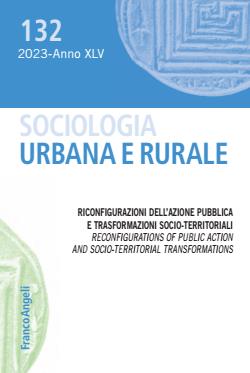Issue 137/2025 PROCESSI DI INVECCHIAMENTO E TERRITORIO
- Magda Bolzoni, Valeria Cappellato, Eugenia Mercuri, Corpi che invecchiano in città che cambiano. Persone anziane e vita quotidiana in contesti urbani tra senso di appartenenza ed esclusione (Aging bodies in changing cities. Older adults and everyday life in urban spaces between sense of belonging and exclusion)
- Rebecca Paraciani, Emma Garavaglia, Active ageing in marginal areas: a scoping review
- Nunzia Borrelli, Giulia Mura, Lisa N.R. Pigozzi, Why not? Perché i Musei e gli Ecomusei possono contribuire alla sostenibilità della food governance (Why not? How museums and ecomuseums can contribute to the sustainability of food governance)
- Orkide Izci, Spazi di appartenenza: pratiche e ambivalenze del concetto di casa delle donne curde-alevite (Spaces of Belonging: practices and ambivalences of the concept of home for Kurdish-Alevi women)
- Veronica Allegretti, Foodscape e strategie di sopravvivenza: il caso torinese (Foodscape and strategies of survival: the case of Turin)
- Veronica Conte, Mattia Fiore, Quale rapporto tra capitali e territori? Prospettive teoriche e di ricerca sulla finanziarizzazione dello sviluppo urbano
- Roberto Paladini, Le influenze del sistema territoriale all’innovazione e allo sviluppo dell’Artigianato artistico (The influence of the territorial system to the innovation and development of artistic craftmanship)
